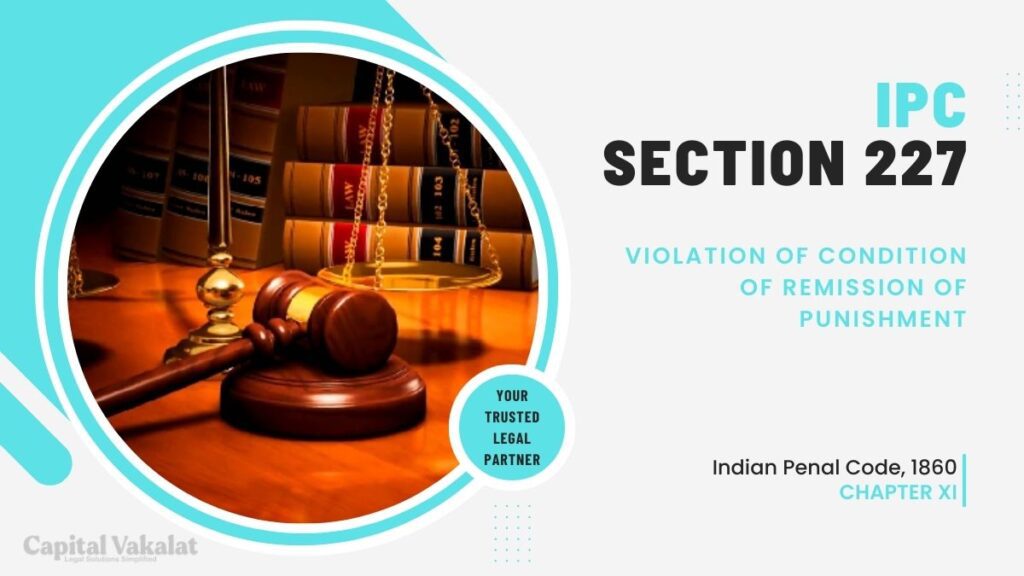Section 227 of the Indian Penal Code (IPC) deals with the violation of conditions of remission of punishment. It is a critical aspect of the legal framework in India, designed to ensure that individuals who have received leniency in their sentences adhere to the terms and conditions set for their release.

In this article, we will delve into the intricacies of Section 227 IPC, its importance, and the consequences of violating remission conditions.
Understanding Section 227 IPC
Section 227 IPC outlines the legal framework for individuals granted remission. Remission is a process where a portion of a prisoner’s sentence is forgiven, typically for demonstrating good behavior or participating in rehabilitation programs. This section governs the release of prisoners on such terms.
When an individual is granted remission, they are obligated to follow specific conditions. Violating these conditions can lead to severe legal consequences. These conditions may include reporting to a probation officer, maintaining good conduct, or not committing any further offenses.
Consequences of Violating Remission Conditions
The violation of remission conditions is a serious matter. The consequences may include the revocation of remission, leading to the individual serving the remainder of their sentence in prison. It can also result in additional criminal charges, depending on the nature of the violation.
To better understand the gravity of these consequences, let’s consider a case example. Imagine a person granted remission for good behavior, who subsequently commits a new offense. This individual not only loses the remission benefits but also faces new criminal charges.
Challenges Faced by Convicts
Individuals on remission often face several challenges. The transition from prison life to the outside world can be overwhelming. They may struggle to find stable employment, housing, and re-establish relationships with their families. These difficulties can contribute to violations of remission conditions.
Common challenges include the stigma associated with being a former convict, limited resources, and a lack of guidance. It’s important to recognize these challenges to address them effectively.
Preventing Violations
To prevent violations of remission conditions, individuals must understand the importance of strict compliance. They should actively engage in rehabilitation and reintegration programs to increase their chances of successful rehabilitation.
It is vital for ex-convicts to maintain contact with their probation officers and seek legal counsel when in doubt. Staying away from criminal activities and building a support network can significantly reduce the risk of violating remission conditions.
Role of Legal Counsel
Legal counsel plays a crucial role in assisting individuals on remission to navigate the complex legal landscape. Lawyers can provide guidance on remission conditions, help individuals understand their rights and obligations, and intervene in case of potential violations.
In the event of a violation, legal counsel can explore legal options, including appeals or requests for reconsideration. They act as advocates for those on remission and ensure their rights are protected.
Public Perception and Stigma
Society often carries a negative perception of individuals who have been in the criminal justice system. This stigma can be a significant barrier to reintegration. It is essential to challenge these prejudices and promote a more empathetic view of ex-convicts.
By understanding the challenges they face and the importance of second chances, society can contribute to the successful reintegration of individuals on remission.
Case Studies
Let’s look at real-life cases of individuals who successfully adhered to their remission conditions. These individuals underwent rehabilitation and reintegration processes, transformed their lives, and became productive members of society. These stories highlight the potential for positive change when individuals are given a second chance.
Rehabilitation and Reintegration
The ultimate goal of remission is not only to release individuals from prison but also to help them reintegrate into society successfully. Rehabilitation programs, education, and vocational training can significantly contribute to this process.
By investing in the rehabilitation of individuals, society can reduce recidivism rates and create a safer and more inclusive community.
Conclusion
Understanding Section 227 IPC and the violation of conditions of remission of punishment is crucial for individuals, legal professionals, and society at large. By recognizing the legal framework, challenges faced by convicts, and the importance of rehabilitation, we can work together to ensure that remission leads to successful reintegration rather than recidivism.
Frequently Asked Questions
What are some common remission conditions?
Common remission conditions may include reporting to a probation officer, maintaining good conduct, and not committing any further offenses.
What legal consequences can one face for violating remission conditions?
Consequences may include the revocation of remission, additional criminal charges, and the serving of the remainder of the original sentence.
How can society support individuals on remission?
Society can support individuals on remission by challenging stigma, offering resources for rehabilitation, and promoting an empathetic view of ex-convicts.
What role does rehabilitation play in remission success?
Rehabilitation programs are crucial for the successful reintegration of individuals on remission, reducing the likelihood of re-offending.